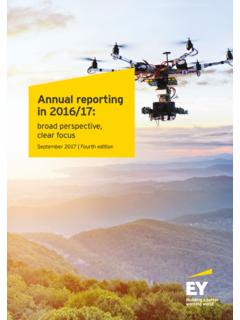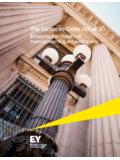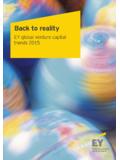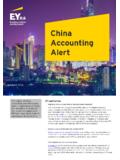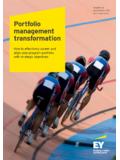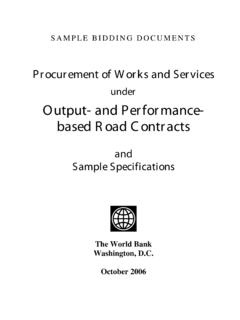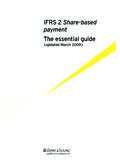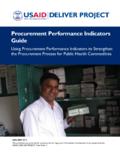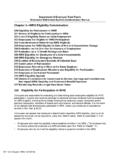Transcription of Accounting for share-based payments under IFRS 2 …
1 Applying IFRS. IFRS 2 Share- based Payment Accounting for share- based payments under IFRS 2 - the essential guide April 2015. Contents 1. Overview and 3. 2. Scope of IFRS 2 .. 4. 3. Basic principles .. 5. 4. Equity-settled awards .. 6. Measurement 6. Determination of grant date .. 7. Vesting conditions .. 8. Non-vesting conditions .. 9. Impact of conditions on measuring share- based payments .. 10. Vesting period .. 12. Valuation of awards .. 13. 5. Cash-settled awards .. 14. 6. Modifications, cancellations and 16. 7. Share- based payment awards with a cash alternative .. 17. 8. Exchanges of share- based payment awards issued in a business combination .. 18. 9. Group share- based payment plans .. 20. 10. Taxes on share- based payment awards .. 21. 11. 21. 12. Transition to IFRS .. 22. 13. Concluding remarks.
2 22. Appendix: IFRS 2 Glossary .. 23. 1 April 2015 Accounting for share- based payments under IFRS 2: the essential guide What you need to know IFRS 2 Share- based Payment requires an entity to measure and recognise share- based payment awards to employees or other parties - in its financial statements. IFRS 2 sets out measurement principles and specific requirements for three types of share- based payment transactions: equity-settled, cash-settled, and when there is a choice of either cash or equity-settled. Share- based payment awards are measured at the fair value of the goods and services received. Where the fair value1 of goods and services cannot be measured reliably, the share based payment is measured by reference to the fair value of the equity instruments granted. A share- based payment award generally vests upon meeting specified conditions, which can either be service conditions or performance conditions.
3 Awards are expensed as vesting conditions, if any, are satisfied. 1 IFRS 2 uses the term fair value' in a way that differs in some respects from the definition of fair value in IFRS 13 Fair Value Measurement. Therefore, when applying IFRS 2, an entity measures fair value in accordance with IFRS 2 and not IFRS 13. For the purposes of this publication, references to fair value are made in the context of IFRS 2 and not IFRS 13. April 2015 Accounting for share- based payments under IFRS 2: the essential guide 2. 1. Overview and background Share- based payment awards (such as share options and shares ) are common features of employee remuneration for directors, senior executives and other employees. Some entities also issue shares or share options to pay suppliers, such as providers of professional services.
4 Prior to the issuance of IFRS 2 Share- based Payment (IFRS 2 or the standard), there was no IFRS covering the recognition and measurement of these types of transactions. This became a key issue for executives, entrepreneurs, employees and directors, given the increasing prevalence of share- based payment awards in many countries. As share- based payment awards became a larger component of employee and executive compensation ( , in the Silicon Valley technology companies in the late 1990s), standard-setters came to believe that share- based payment awards are an integral component of a total compensation package. As such, they concluded that an entity should recognise an expense for share- based payments , just as it does for cash compensation. IFRS 2 was issued in February 2004 and prescribes the measurement and recognition principles for all share- based payment awards within scope of the standard.
5 IFRS 2 applies to share- based payment transactions with employees and third parties, whether settled in cash, equity instruments or other less common assets ( , gold). The standard has been amended several times since it was issued. Most recently, it was amended as part of the Annual Improvements to IFRSs 2010-2012 Cycle with respect to vesting conditions;. these amendments became effective on 1 July 2014. The application of IFRS 2 involves difficult classification and complex valuation issues and, as described below, is sometimes counter-intuitive. The general principle of IFRS 2 is that an entity recognises an expense or asset for goods or services, with the credit entry recognised either in equity or as a liability (depending on how the share- based payment award is required to be settled).
6 The definitions of equity' and liability' in IFRS 2 are different from those used in IAS 32 Financial Instruments: Presentation and IAS 39 Financial Instruments: Recognition and Measurement (or IFRS 9 Financial Instruments). IFRS 2 also uses the term fair value' in a way that differs in some respects from the definition of fair value in IFRS 13 Fair Value Measurement. Therefore, in Accounting for share- based payment transactions an entity measures fair value in accordance with IFRS 2, not IFRS 13. After much debate, the IASB settled on a grant date model to measure share- based payment awards to employees (see sections 4 and 6). under the grant date model, an entity measures the fair value of a share- based payment award issued to an employee on the grant date. For equity-settled share- based payments , the entity does not adjust the grant date fair value afterwards (even if it becomes more or less valuable or does not ultimately vest), unless the award is modified.
7 Frequently, this results in an entity recognising an expense even if the employee receives no monetary benefit from the award. Although this situation seems counter-intuitive, we believe this model is preferable to entities not recognising any expense for share- based payment transactions. In this publication, we provide an overview of IFRS 2 and explore some of the basic concepts by providing illustrations of how to apply them. We also include a glossary of terms in the Appendix. 3 April 2015 Accounting for share- based payments under IFRS 2: the essential guide 2. Scope of IFRS 2. IFRS 2 encompasses three types of transactions: Equity-settled share- based payment transactions in which the entity receives goods or services as consideration for its own equity instruments or those of another entity in the same group or a shareholder of any group entity Cash-settled share- based payment transactions, also referred to as liability awards', in which the entity receives goods or services and incurs a liability based on the value of the entity's shares or other equity instruments of the entity or another group entity ( , the grant of share appreciation rights to employees, which entitle the employees to future cash payments based on the increase in the entity's share price).
8 Share- based payment transactions with cash alternatives in which the entity receives goods or services and either the entity (or another group entity). or the supplier of the goods or services (the counterparty) has a choice of the entity settling the transaction in cash, other assets, or by issuing equity instruments IFRS 2 provides requirements on group share- based payment plans, which is The scope of IFRS 2 discussed further in see section 9. Group' is defined in IFRS 2 as a parent and is not restricted to its subsidiaries from the perspective of the reporting entity's ultimate parent. transactions with Goods and services referred to above can be received from external suppliers employees. or employees. For example, if an external supplier of goods or services is paid in shares , share options or cash based on the price (or value) of shares or other equity instruments of the entity, IFRS 2 must be applied.
9 Goods do not include financial assets, but do include inventories, consumables, property, plant and equipment, intangibles, and other non-financial assets. Likewise, an employee may receive equity instruments as remuneration for services rendered. Even if an entity cannot specifically determine the goods or services it receives in return for its shares , it must apply IFRS 2. For example, if an entity grants shares to a charity for no identifiable benefit, that transaction is within the scope of IFRS 2. IFRS 2 does not cover the following transactions: Transactions with shareholders that are acting solely in their capacity as shareholders Goods and services received by the entity that are settled by entities or shareholders not within the group Transactions within the scope of IAS 32 and IAS 39 (or IFRS 9).
10 Share- based payment transactions to acquire goods as part of a business combination to which IFRS 3 Business Combinations applies, in a combination of entities or businesses under common control, or the contribution of a business on the formation of a joint venture, as defined by IFRS 11 Joint Arrangements Transfers of assets in certain group restructuring arrangements Awards granted to employees of an acquiree in their capacity as employees ( , in return for continued service) are within the scope of IFRS 2, as are the cancellation, replacement and modification of share- based payment awards as a result of a business combination or other equity restructuring. April 2015 Accounting for share- based payments under IFRS 2: the essential guide 4. 3. Basic principles When an entity enters into a share- based payment arrangement, it needs to determine: 1.


